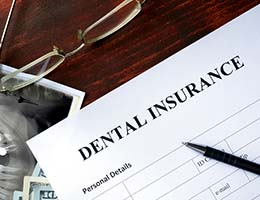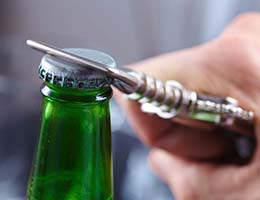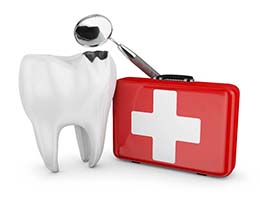Emergency Dentist — Ann Arbor, MI
Pain Relieving & Smile Restoring Dental Care
 There are many kinds of dental emergencies, but do you know what they all
have in common? No one ever plans for them to happen. Trust us when we say
that they are always unexpected! Fortunately, you can have a plan on what to
do should you ever find yourself in the middle of a dental emergency, and
that plan should be to
call Dr. James Olsen for emergency
dentistry in Ann Arbor, MI.
There are many kinds of dental emergencies, but do you know what they all
have in common? No one ever plans for them to happen. Trust us when we say
that they are always unexpected! Fortunately, you can have a plan on what to
do should you ever find yourself in the middle of a dental emergency, and
that plan should be to
call Dr. James Olsen for emergency
dentistry in Ann Arbor, MI.
There are many kinds of dental emergencies, but do you know what they all have in common? No one ever plans for them to happen. Trust us when we say that they are always unexpected! Fortunately, you can have a plan on what to do should you ever find yourself in the middle of a dental emergency, and that plan should be to call Dr. James Olsen for emergency dentistry in Ann Arbor, MI.
Dr. Olsen and our team are able to handle a wide variety of dental emergencies in-house, and we always try to see emergency patients the same day that they call in. Basically, if you’re ever in pain, we won’t keep you waiting. If you or a loved one ever experience a dental emergency, try not to worry, because we will take care of you.
Why Choose James Olsen DDS for Emergency Dental Care?
- Same-Day Appointments Available
- Modern Technology in a Welcoming Office
- Highly Experienced Dentist with Advanced Training
What to Do in a Dental Emergency

- Same-day appointment: After you get in touch with our practice, we’ll do everything we can to get you seen by Dr. Olsen and our team, ideally the same day that you call. Time is of the essence when it comes to dental emergencies, so the sooner we can get your symptoms treated, the better. We’re also happy to give first-aid tips over the phone.
- Emergency exam: Once you arrive, one of our team members will bring you to an operatory where Dr. Olsen will perform an emergency exam and complete any digital X-rays if needed. Our top priority is getting you out of discomfort first so you can get relief.
- Review findings: After the exam, Dr. Olsen will break down his findings and create a treatment plan that’s personalized to you. This includes the services we recommend, the amount of time we expect your care to take, and the estimated costs attached.
- Get the care you need: The most common treatments we typically suggest for dental emergencies include dental fillings, crowns, TMJ therapy, root canal therapy, and extractions, but other options may be recommended as well if needed.
The Most Common Dental Emergencies
Tooth decay, damaged teeth, and severe gum disease are some of the most common dental emergencies we treat, but they are far from the only emergencies we can address. Since they come in many different forms, it’s important to seek care from us as soon as possible and don’t leave them up to chance. In the meantime, there are ways you can manage your situation ahead of your appointment.
Understanding the Cost of Dental Emergencies

When it comes to the cost of pain relieving and smile restoring dental care, every situation is unique. Ultimately, the price of treating your dental emergency will depend on the type and severity of your problem. For example, treating a toothache may be as simple and inexpensive as getting a filling or prescription, but it could also require a lengthier treatment like root canal therapy or an extraction. Once you reach our office, we’ll work quickly to confirm exactly what’s going on, prescribe a treatment plan, and discuss affordable payment options with you.
Every Dental Emergency is Different

While there is no set cost for treating dental emergencies, you can rest assured that we offer fair and reasonable prices for the emergency treatments you need. Once we’ve taken a look at your mouth and diagnosed the issue, we’ll be able to recommend an action plan and the estimated cost. The most common treatments we use to address dental emergencies include:
- Dental crowns
- TMJ treatment
- Root canal therapy
- Tooth extractions
- And many more!
We will always take the time to explain our findings, the recommended treatment(s), and a personal estimation of costs beforehand so you know exactly what to expect.
Taking Care of Your Smile Can Save You Money

Not all dental emergencies are unavoidable. Some are the result of unchecked infection or damage caused by poor oral hygiene or bad dental habits. Simple steps like brushing, flossing, and getting two dental checkups a year can save you thousands of dollars in prevented dental emergencies over the years.
If your tooth does become damaged or starts to hurt, it’s essential that you don’t put off getting treatment even if you’re concerned about costs. Remember, your teeth can’t heal themselves like the rest of your body. The longer you wait to fix issues like cavities, inflamed gums, or chipped teeth, the more likely they are to advance into serious, painful, and expensive issues like dental infections, gum disease, and broken teeth.
Does Dental Insurance Cover Dental Emergencies

While every dental insurance policy is different, many offer some form of coverage for emergency situations. Many policies will include 90-100% coverage for one emergency exam every year. In addition, the most common services used for dental emergencies such as gum disease therapy or a dental crown receive partial coverage typically between 50-80%. Our knowledgeable team will be happy to review the details of your policy with you to make sure your benefits are being maximized.
Other Options for Making Dental Emergencies Affordable

If you don’t have dental insurance or adequate coverage, treating dental emergencies can still be affordable. We’re pleased to offer financing options through CareCredit. This third-party company has low- to no-interest payment plans so you don’t have to pay for your entire treatment all at once. Instead, the cost can be broken up into smaller payments that easily fit into your monthly budget. If you’re still concerned about the price of caring for your smile, don’t hesitate to give us a call and we’ll be happy to help you navigate the cost and ensure that regaining optimal oral health is as affordable as possible.
How to Prevent Dental Emergencies

It’s fair to say that dental emergencies can occur even when you take all the right steps to avoid them. However, that doesn’t mean that you can’t practice harm reduction during your day-to-day activities. Whether you’re very active, an adventurous eater, or simply prone to dental harm more than the average person, taking these preventive tips into account can make all the difference going forward. Keep them in mind and your smile will thank you!
Visit Your Dentist Regularly

Make sure to come and see us for regular checkups and cleanings so we can catch a small problem before it turns into an emergency later. This is one of the most effective ways to prevent dental emergencies like toothaches and infections caused by tooth decay and gum disease. Most dental issues don’t make themselves noticeable until it’s already too late, which is why routine exams are so crucial. Furthermore, cleanings give us a chance to address any plaque or tartar (which only dental professionals can remove) before they cause dental emergencies and cost you more to treat.
Maintain Good Oral Hygiene at Home

You won’t be visiting the dentist twice a day every day to get your teeth cleaned, which means you’ll need to make sure you are brushing at least twice a day and flossing daily to keep food debris, plaque, and cavity-causing bacteria at bay. Use a fluoridated toothpaste as well; fluoride is proven to reduce the risk of developing cavities. Brush for two minutes at a time and do not snap your floss when cleaning teeth so you don’t damage enamel. Adding a mouthwash to your routine can also be beneficial, especially if you have restorations or dental implants to keep clean.
Stick to a Nutritious Diet

Don’t chew on extremely hard items like ice or hard candies as they can easily cause teeth to chip and even crack. Sticking to a diet that’s low in sugars and starches will also make it more difficult for oral bacteria to produce plaque acids that harm teeth and gum tissue. Make an effort to include fruits, vegetables, dairy products, and proteins into your meals as they often contain vitamins and minerals conducive to oral health.
Wear a Mouthguard

Always wear a mouthguard when playing sports, contact or otherwise. Physical activities, including sports in particular, carry a high risk for sudden impact. This can leave teeth not just chipped or cracked but completely knocked out. Store-bought solutions are better than nothing at all, but custom-made mouthguards from our dental office are the best option out there. This is because they are designed to fit inside your mouth exactly, ensuring better comfort and longevity.
Use the Right Tool for the Job, Not Teeth

Don’t use your teeth to open bottles, packages, or remove tags. Instead, use the right tool for the job. That means using a bottle opener for certain beverages, scissors or box cutter to open packages and cut tags, and nail clippers to trim fingernails. Using teeth is one of the easiest ways to trigger a dental emergency and a whole lot of dental discomfort that could have been avoided.
Dental Emergency FAQ’s

Dealing with teeth that are hurting, damaged, or dislodged can be extremely stressful and anxiety-inducing. Fortunately, Dr. James Olsen and the rest of our dental team are here to help you soothe your worries while also getting your oral health back on the right track. In the meantime, though, you may have some questions about emergency dentistry. We’ve done our best to answer the emergency questions that we get asked the most frequently down below.
What Constitutes a Dental Emergency?
Because oral pain and discomfort can be quite common, it can be difficult to tell whether your situation warrants a visit with your emergency dentist in Ann Arbor. The most common signs that you need urgent dental care include:
- Severe pain
- Intense bleeding
- Teeth that are broken, loose, or missing
Even if you’re not sure that what you’re experiencing is an emergency, it’s better to err on the side of caution and give us a call anyway. When it comes to your oral health, it’s much better to be safe than sorry.
Should I Call the Emergency Room?
Sometimes, in a dental emergency, your first instinct may be to call the hospital instead of our dental office. This is the right call if you have a broken jaw, profuse bleeding after 15 minutes of applying pressure, or intense swelling that hinders your ability to swallow or breathe. However, in most cases, you’re better off contacting us instead.
Most emergency rooms don’t have a dentist on staff. As a result, the best they may be able to do for you is write a prescription for antibiotics or pain medication. They won’t be able to deal with the root cause of your infection, and they certainly don’t have the equipment necessary to heal a broken tooth. Cases like these are best left to actual dentists like Dr. Olsen.
Does My Tooth Need to Be Removed?
You might think that pulling your tooth might get rid of your dental pain at the source. However, we generally only extract a tooth as a last resort. Missing teeth come with a whole host of oral health problems, like weakening your jawbone and putting you at risk for further tooth loss. Because of this, we avoid extraction unless all other treatment options have been exhausted. If we determine that extraction is necessary, though, we’ll walk you through the process, including tooth replacement options.
My Toothache Went Away. Do I Still Need Treatment?
If your toothache fades away, you might be relieved at first, but the truth is that if your pain was due to an infection, your problem is far from over. A loss of pain could mean the nerve inside the tooth is “dead,” so it has stopped sending pain signals to the brain. Ignoring the problem could cause the infection to spread to other parts of your mouth or even other areas of your body. See us as soon as you can if your toothache goes away. It could save your tooth from needing an extraction.
UNANSWERED QUESTIONS
What steps should I take if my tooth is loosened or knocked out?
Dental emergencies like a knocked-out tooth can feel overwhelming, but acting quickly can make a big difference. If a tooth is completely knocked out, handle it by the crown (top part), not the root. Gently rinse off any dirt with water or milk. Do not scrub the tooth or wrap it in tissue.
Try to place the tooth back into the socket and hold it gently in place. If that’s not possible, keep it moist by placing it in milk or holding it in your cheek. Water should only be used as a last resort.
For a loosened tooth, avoid wiggling it. If it appears out of position, gently realign it with light pressure. Seek dental care immediately — time is critical for saving the tooth.
How should I handle a broken, chipped, or cracked tooth before seeing a dentist?
If a tooth breaks or cracks, rinse your mouth gently with warm water to remove debris. If sharp edges are present, cover them with dental wax or sugar-free gum to prevent irritation.
Avoid chewing on that side of your mouth and stay away from hard, crunchy, or sticky foods. Applying a cold compress to the cheek can help reduce swelling and discomfort.
Because cracked teeth can worsen without treatment, contact our office as soon as possible to schedule care.
What should I do if I have a dental emergency outside of regular office hours?
If you experience severe pain, excessive bleeding, or a serious dental injury outside office hours, call our office and leave a detailed message so we can respond as soon as possible.
For non-life-threatening issues, a local pharmacy or urgent care clinic may provide temporary relief until you can be seen.
If your emergency is life-threatening — such as swelling that affects breathing or uncontrollable bleeding — go directly to the nearest emergency room.
How should I manage bleeding or swollen gums before visiting a dentist?
If your gums are bleeding, gently apply clean gauze or a damp cloth with light pressure to help control it. Avoid touching or irritating the area further.
Swollen gums may indicate infection or gum disease. Rinse gently with warm salt water and avoid spicy, hard, or crunchy foods. Do not use alcohol-based mouthwashes.
If swelling worsens, pain increases, or you notice pus, fever, or difficulty swallowing or breathing, contact us immediately.
How do I find an emergency dentist near me?
If you need emergency dental care, start by searching online for “emergency dentist near me.” Many practices advertise same-day or urgent appointments on their websites.
- Use tools like the ADA Find-a-Dentist or Zocdoc
- Call local dental offices directly and explain your situation
- Check for dental urgent care clinics or after-hours services
- Contact your dental insurance provider for in-network options
Acting quickly can help protect your smile and prevent long-term complications.
What follow-up care might be needed after an emergency dental visit?
After emergency treatment, your dentist may recommend follow-up care to protect your oral health. This can include:
- Root canal therapy to treat infection or nerve damage
- Dental crowns or fillings to restore damaged teeth
- Follow-up visits to monitor healing
- Tooth replacement options like implants, bridges, or dentures
Your dentist will create a personalized treatment plan to prevent future problems and keep your smile healthy.
What are the signs of wisdom teeth problems that require emergency dental care?
Wisdom teeth issues can cause pain, swelling, and infection. Warning signs include:
- Throbbing pain or swelling at the back of the mouth
- Red, irritated, or infected gums
- Difficulty opening your mouth, chewing, or swallowing
- Fever, pus, or jaw swelling
Emergency evaluation allows your dentist to diagnose the issue and determine if extraction or other treatment is necessary.
How do dental savings plans work for emergency dental care?
Dental savings plans are membership-based programs that offer discounted dental services for an annual fee. They are not insurance but can provide immediate savings.
- Immediate activation with no waiting periods
- 10–30% discounts on emergency procedures
- No claims — you pay the discounted rate directly
These plans can be helpful if you don’t have insurance and need urgent dental care.
Can sinus pressure cause dental pain, and how is it evaluated?
Yes, sinus pressure can cause pain in the upper teeth, especially when several teeth hurt at once. Inflamed sinuses can press against tooth roots and mimic a toothache.
We’ll examine your teeth and may take X-rays to rule out dental causes. If no dental issue is found, we may recommend follow-up care with your physician.
Our goal is to accurately diagnose the source of your pain and guide you to the right treatment.
More to Explore
Preventive Dentistry Restorative Dentistry Dental Implants Cosmetic Dentistry TMJ Therapy Advanced Technology View Our Services

